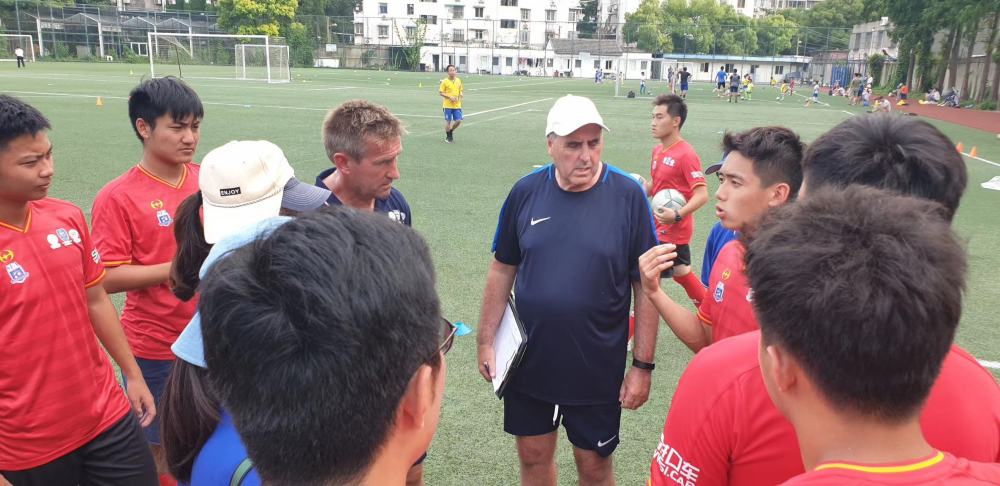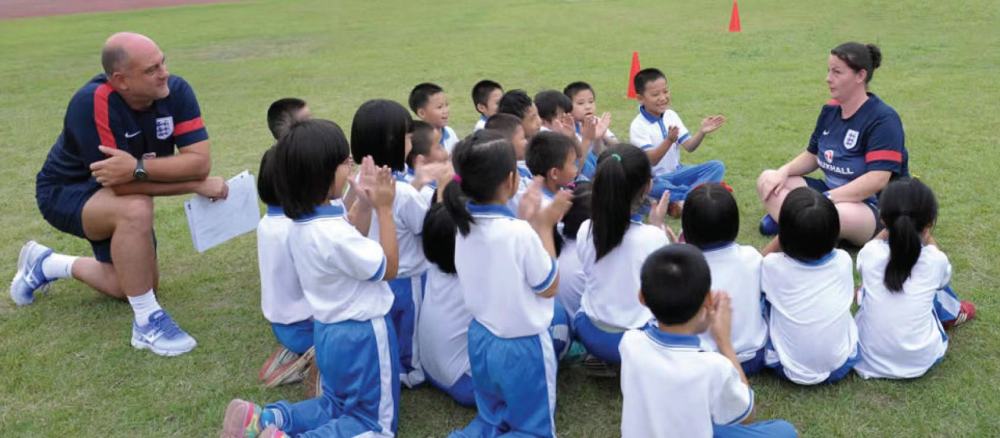
Ready for the big draw - big5
European soccer clubs and players seek greener pastures in China

Italian coach Marcello Lippi (center) talks to his assistants during his first match
managing Guangzhou Evergrande. Provided to China Daily
Expectations are running high that big-ticket names would soon make a beeline for soccer clubs in China, after former Italian World Cup-winning coach Marcello Lippi decided to be a part of the Chinese Super League (CSL).
Who's next is the question most posed by soccer aficionados. Many expect that it will be Didier Drogba, the Cote d'Ivoire international who has just helped English side Chelsea win this year's European Champions League Final.
Besides of the big crowds that these names automatically draw, fans are also hopeful that they will be a much-needed shot-in-the-arm for the sport in China. Many believe that soccer is still a long way from reaching the heights achieved by China on the economic front or in the international arena.
There is also the flip side to this whole phenomenon in the sense that China could prove to be a safe haven, considering that Europe, the bastion of soccer, is not exactly in the pink of health. Interest in the game is increasing in China, along with the number of rich people who have bulging investment pockets.
Earlier this month, defending CSL champions Guangzhou Evergrande started the soccer frenzy by roping in Lippi, who led Italy to a World Cup win in 2006. Club owner Xu Jiayin, a real estate baron, feels that the high-profile international coach will not only boost Guangzhou Evergrande's fortune, but also help it achieve an international reputation.
"We made the decision to sign Lippi a year ago, as we felt that it was in tune with our long-term strategic needs. We are looking to transform the club into an international-level one," Xu says.
Though neither Xu nor Lippi would disclose the exact remuneration, the 64-year-old Italian coach admitted that money was one of the big attractions for him to sign on the dotted line.
"I have turned down invitations from other European clubs and some from Qatar. The Guangzhou side's offer was more on the lines of what I would have made with any European club. So I thought why not take up the China offer," Lippi says.
The Milan-based La Gazzetta dello Sport reported that the Chinese club has offered Lippi in the region of 10 million euros for a single season.
The Italian coach is the biggest name to join Chinese soccer from Europe after Shanghai Shenhua signed French striker Nicolas Anelka from Chelsea at the beginning of this season.
Anelka's former Chelsea mate Drogba has also been linked to Shanghai, although his heroics in helping the London-based club win the FA Cup and UEFA Champions League could put a brake on his China plans.
Another reason why more soccer stars are heading toward China is the increased outlays being made by the clubs to acquire the services of foreign players, with a view to spruce up their international standings.
Paraguay international Lucas Barrios has agreed to a four-year transfer deal worth 8.5 million euros to play for Guangzhou Evergrande. The former Borussia Dortmund striker is expected to join the side next month.
The Guangzhou side has also signed a contract with Argentine midfielder Dario Conca, who set the Chinese league transfer record with a reported $10 million (7.9 million euros) deal last year.
Italian media also reported that 36-year-old AC Milan midfielder Clarence Seedorf has traveled to China for talks with several CSL clubs, such as Beijing Guo'an, Guangzhou Evergrande and Shanghai Shenhua.
Xu's company, Evergrande Real Estate Group, started its soccer involvement two years ago when it took over the Guangzhou club in March 2010 with an initial investment of 100 million yuan ($15.8 million, 12.7 million euros).
"Before being involved in China's sport sector, Xu's company was just a local real estate brand. But now it has gained an international reputation," says Xie Liang, a veteran soccer commentator with Radio Guangdong.
The company has continued with its investment in the soccer sector, and plans to start an international soccer school cooperative in September. Sources close to the company said its net profit increased from 8 billion yuan in 2010 to 11.8 billion yuan last year.
"As a businessman, Xu's goal in sports investment is very simple - to realize more profits in the long run," Xie says.
Apart from the Chinese sides hunting for famous coaches and top players, there has also been more interaction between China and the world's leading soccer powers in recent years.
English soccer education will also head toward China as FA Learning. The educational body of England's Football Association, based in London, reached an agreement last week to team up with London's Dr Sun Yi Xian's Youth Foundation.
According to the first partnership between China and the FA, the foundation will work with FA Learning to deliver a range of soccer training and education courses for coaches, players and referees in China.
Youth soccer education and training, the strength of English soccer according to Jamie Houchen, head of FA Learning, will be the focus of the partnership. A team of FA registered coaches is expected to visit China later this autumn to work with coaches from 62 Chinese cities.
Nelson Cheng, CEO of the foundation, praises the new partnership as "an exciting and immensely important step in developing cultural, educational, economic and sporting relations between China and the UK".
Economic interest, or revenue, however, has been the key driving force for Western clubs to enter and expand in the Chinese market in recent decades.
Playing commercial friendly matches in China was the most popular way till a few years back. Italian Serie A side Sampdoria, now in Serie B, played China's national team in Beijing in May 1994.
The match offered Chinese soccer fans the first ever chance to watch a leading European side play up close, and started a Sampdoria craze in China.
Following its early success, the Italian side came to China to play more commercial matches again in 1995, opening the door for other leading western clubs to follow suit.
Touring Asia and China is now a permanent fixture on the agenda of most European soccer clubs, especially in the period before the soccer season commences in Europe.
Past Serie A title and Coppa Italia winners, AC Milan and Inter Milan played their Suppercoppa Italiana match at the Bird's Nest stadium in Beijing in 2011.
Super Copa de Espana matches, between the winners of La Liga and the Copa del Rey, will also be played in Beijing in the next four years, according to a deal announced last week.
Real Madrid, this year's La Liga winner, will take on the winner of this weekend's cup final between Barcelona and Athletic Bilbao at a match in Beijing later this year.
Though the stakes are indeed high for European soccer players and clubs in China, there has also been criticism from several quarters that the foreign sides, officials and players have not done much to revitalize the game in China.
Revenue-oriented efforts in the Chinese market "don't necessarily" make European clubs "bad people", but "from a Chinese point of view, it's not necessarily in their (Chinese soccer fans) interests", says Sean Hamil, an expert on soccer management at Birkbeck College, University of London.
"I would raise serious questions about whether or not English clubs, for example, are going to China with a real idea of partnership," Hamil responds when asked to analyze English third-division League One side Sheffield United's unsuccessful experience in Chengdu, Sichuan province.
Kevin McCabe, Sheffield United chairman, returned to the southwestern Chinese city on Monday to "re-invest" in Chengdu Blades Soccer Club (CBFC), a Chinese second-division side Sheffield United sold in February 2011, according to reports in Chengdu Evening News.
Sheffield United took over the Chengdu side in 2006 from a local cigarette maker and renamed it Chengdu Blades, to share the same nickname.
Being promoted to the Chinese Super League more than one year later, the first ever English-owned Chinese side did not enjoy any lasting success and it was relegated to China League One in 2010 due to a match fixing scandal.
"We were very disappointed with our home team, as we initially expected the English club to spend huge sums on top players and also bring about advanced team management," says Zhang Jianning, a 57-year-old local fan.
"There is a question to be asked: is the relationship between European soccer clubs and the Chinese market opportunistic? Or is it genuinely strategic?" Hamil says, adding that limited financial resources might have hampered Sheffield United, as it is not a global brand by itself.
Noting he respect Sheffield United as a team, Hamil says that he considers the inability to shore up revenues as the prime reason the English club decided to move out of China.
source from: China Daily European Weekly - Ready for the big draw
China Daily European Weekly - Ready for the big draw PDF version
中英足球教育園將在廣東籌建
新華社多哈於2022年12月16日電(記者王子江 王浩明)“中英校園足球項目”負責人鄭少強16日表示,為發展中國青少年足球運動,他擔任總幹事的英國孫中山青少年基金會將在廣州從化區上塘村興建中英足球教育園。

孫中山青少年基金會是2003年在英國申請註冊成立的非營利機構,“中英校園足球項目” 是由該基金會在2012年與英格蘭足總簽署的長達15年的校園足球推廣協議,由基金會挑選被列入英足總和英格蘭校園足協名單的、擁有資深足球教學經驗的專家,為中國引進英格蘭校園足球啟蒙教育的新理念,推廣英式足球教育。
“中英校園足球項目”第一步在中國開設教練課程,先後培訓了近300名掌握中英文教育技能、擁有國際認證證書的足球教練。 2018年7月,項目第二步啟動,他們與同濟大學開展合作,有15552名足球教學愛好者參加了基礎教學課程。
鄭少強說:“中英足球教育園的籌建是‘中英校園足球項目’發展的第三步,這一步的核心工作是組建具備豐富足球教學知識與經驗的專家人才隊伍,長期性、系統性地引入英格蘭和歐洲足球教育、足球經濟、足球品牌等。”

2012年,英格蘭足總技術官員傑米·霍琛代表英足總簽署“中英校園足球項目”協議,霍琛現在已成為國際足聯技術部主任,他在卡塔爾世界杯期間接受記者採訪時表示,鄭少強在廣州籌建足球教育園的計劃,勢必將加快中國校園足球的發展,也契合國際足聯人才培養項目的理念。
“尼爾森(鄭少強的英文名字)多年來對足球保持了很大的激情,他也為足球投入了大量的精力和資金,廣州足球教育園的建設是一項非常有前瞻性的規劃,他現在與英國教練的合作已經非常成熟,如果他的計劃能夠成功,會有來自其他國家和地區的教練也加入進來,對中國足球長遠發展都是有好處的。”霍琛說。
中英校園足球交流面臨機遇和挑戰——專訪中英校園足球項目負責人鄭少強
中英校園足球交流面臨機遇和挑戰——專訪中英校園足球項目負責人鄭少強
2016年03月10日14:55 來源:新華社新華社倫敦3月7日體育專電(新華社記者王子江)“中英校園足球項目”啟動三年多來,通過該項目的第一階段英國的足球教學專家已經為中國培訓了近300名英格蘭校園足球國際基礎課程的教師,中英校園足球項目的培訓正進入快車道。該項目負責人鄭少強在接受新華社記者專訪時表示,中英校園足球項目給中國足球帶來了巨大的戰略機遇,但必須穩步推進,避免急功近利,要製定長期的規劃,必須把培訓中國足球教學老師隊伍質量放在首位。

(中英校園足球項目 圖片來源:中山實驗中學官網)
“中英校園足球項目”是由孫中山青少年基金會與英格蘭足總簽署的長達15年的校園足球推廣協議,英文名為“SINO-U.K School Football Project”。協議涵蓋了大中華地區(包括中國大陸、台灣、香港和澳門),由基金會挑選被列入英足總和英格蘭校園足協名單的、擁有資深足球教學經驗的專家,採用英國方面的教材,為大中華地區引進英格蘭校園足球啟蒙教育的新理念,推廣英式足球教育。該項目從一開始就得到了中國教育部和中國駐英國大使館等政府部門的支持。
孫中山青少年基金會是一個在英格蘭註冊的非盈利機構,總幹事鄭少強1988年從香港移居英國,1992年與中國有關機構在倫敦合作出版英文刊物,介紹中國堅持經濟改革開放的有關政策,同時在廣東中山投資建立紡織廠。 2003年,他在北京天安門廣場舉辦中英校園足球起步儀式,開始為“中英校園足球項目”的前期起步籌集資金,推動該項目發展,探索中西方體育經濟和文化教育合作的新渠道。最終他得到了英國皇室主要成員和英國政府有關部門等機構的支持,並在中國有關部門的幫助下,在2012年5月與英足總達成“中英校園足球項目”的協議。
鄭少強認為,中英校園足球項目將在以下領域對中國的足球普及發展有戰略意義:
第一、足球在當今世界已經超越體育運動的含義,成為一個國家軟實力的標誌之一。以前並不注重足球的美國也在英國大規模收購俱樂部,包括阿森納、曼聯和利物浦在內的多支豪門已經由美國公司控股,去年美國主導的國際足聯反腐行動也證明美國正在積極介入國際足球事務。因此,“中英校園足球項目”在推廣中英足球文化教育和產業的合作,以足球文化教育為橋樑,推動中英兩國從去年開始的黃金時代,加快中國軟實力的提升等方面有重要的意義。
第二、英國是現代足球的發源地,也是國際足球規則的重要製定者之一。國際足聯要想修改規則依然要得到英國四家足球協會的通過和批准,英足總的專業足球和校園足球教學培訓教材的編寫和現代足球的教學模式,已有100多年的歷史,包括德國、巴西、法國、意大利、西班牙、荷蘭、日本等世界足球強國的校園足球教師培訓,都參照英格蘭的教材和教學方式。日本在上世紀80年代初開始邀請英格蘭校園足球教學專家協助推動足球改革,在短短30年內日本已成為足球文化和產業的亞洲第一強國。
中國過去30多年來足球發展的教訓證明,發展足球事業,培養足球文化必須從中、小學開始,中國的足球教學必須與世界強國接軌。

(外教講解訓練內容 圖片來源:洛陽市實驗中學官網)
第三、中國經過30多年的經濟改革開放,通過引進西方的資金和技術,一躍成為世界製造業大國。現在中國應以足球發展為契機,通過利用英國先進的足球理念和教材及技術,創建軟實力大國。相信經過未來20至30年的發展,學習全球軟實力大國的精髓,中國能成為世界足球產業文化大國的中心。
第四、有利於海峽兩岸青少年校園足球的交流。 “中英校園足球項目”的協議覆蓋整個大中華地區,孫中山青少年基金會與英國的合作,將加強大中華地區青少年在校園足球方面的交流合作。 2015年10月,該項目已經與中國台北體育運動團體從業人員交流協會簽署了協議,進行為期5年的教學課程,在台灣校園中推廣“中英校園足球項目”的實施。
第五、中國面臨產業轉型,而以足球為代表的體育產業有巨大的發展潛力。通過中英校園足球項目引進英格蘭的經驗,能有效帶動足球文化和產業的開發。中國校園足球和社區足球及專業足球的建設,必須要有國際標準的管理法規和製度做保障,中英校園足球項目可以確保每個足球愛好者自行報名學習現代足球教學的新理念,讓每個喜歡足球的人將發展足球教育普及視為光榮的社會責任,這樣必將促進足球文化和技術的普及,吸引更多的社會資金參與,推動中國新興消費市場的發展,促進中華民族國際頂級品牌的建設。
據統計,英國體育產業佔GDB比重超過2%,而最主要的項目就是足球。美國的體育產業是第七大產業,每年產值是汽車產業的兩倍,而中國這個數字只有0.55%。產業的升級離不開足球文化教學的普及,發展校園足球普及要從培訓足球教師隊伍抓起,是建全中國足球教學的基礎。
當然,鄭少強也認為,根據中英校園足球項目近三年的落實情況來看,雖然在上海和廣東等地舉辦了5期培訓班,得到了受訓學員、中小學生和家長及當地教育部門的讚許,培訓課程和教學質量取得了令人滿意的成果,但很多地區的校園足球也跟著一哄而上,不注重培訓教員的國際標準和要求,使校園足球變成突擊化和麵子工程,校園足球有重蹈功利足球的危險。
他認為,大中華地區發展校園足球首要任務是培養有足球文化興趣的本地教師,讓他們將來成為具有國際教學水平的足球教師,最終由中國面孔的教師進入課堂作主要執教的足球教員,這才是一條科學與循序漸進之路。
他說,足球文化的普及需要中國政府依靠非常嚴謹的製度管理方案和頂層設計來配合,需要製定相應的法規和管理章程,這樣才能使中國足球與國際足球強國的教學體系相融合。
他還說,過去兩年來,“中英校園足球項目”在中國廣東和上海試點時,感覺到有關部門應成立一個強有力的技術監管機構,盡快出台配套政策,以支持中國足球教育部門,尤其是從事足球教育等技術層面的人員和機構,有秩序地進入校園足球培訓的事業中。
鄭少強還說,中國有關省市足球管理部門應提防有機構打著足球培訓的名義謀取利益。已經發現有機構打著發展校園足球的幌子到處招攬學生,收取昂貴的學費到歐洲的專業足球俱樂部“遊學”,試圖以發展校園足球為名斂財。他建議相關部門盡快出台措施,保護外國資金和中國民間資本投入中國足球文化教育發展。他還希望盡快落實中英校園足球教學中心的立項,確保英格蘭足球教學專家擁有一座英國標準的足球教學和培訓中心,幫助中國教師和學生不需要走出國門就能接受英國教練的培訓,節省培訓的資金和時間。
中山英國簽訂15年校園足球合作計劃
中山英國簽訂15年校園足球合作計劃
2015年01月20日05:20 來源:南方日報
原標題:中山英國簽訂15年校園足球合作計劃
南方日報訊 (記者/高薇)1月16日至23日,中英校園足球合作項目——英格蘭校園足球國際基礎課程中山市校園足球培訓班,在中山市實驗中學舉辦。在此期間,72名中小學體育教師,將接受6位英國教練的足球培訓,並參加教學實踐。考評合格者將被授予英足總頒發的結業證書,並獲得英格蘭校園足球國際培訓基礎教材的執教資格。
中英校園足球合作項目:是由英國孫中山青少年基金會(UK)經過10多年的努力,並通過籌集前期全部開發費用而促成的一個公益性項目。該項目旨在協助大陸、香港、澳門和台灣等地構建校園足球培訓的機制與平台。項目一直得到英國王室、政府有關部門、國會相關議員和英足總的讚許和支持。
開班儀式上,英國孫中山青少年基金會總幹事鄭少強和中山市校園足球協會會長馬建軍簽訂了為期15年的關於發展中山市校園足球的戰略合作協議。雙方今後將聯合舉辦中山市初級、中級和高級校園足球培訓班。據英國孫中山青少年基金會相關負責人介紹,這項戰略合作協議是英國孫中山青少年基金會與中國地方的校園足球協會簽訂的第二個開展長期戰略合作的文件。
本期中山市校園足球培訓班是在中國教育部體衛藝司的支持和批准下,由英國孫中山青少年基金會與中山市教體局聯合主辦。它是繼2013年10月“中英校園足球合作項目”首期培訓班和2014年上海市首期校園足球培訓班之後的中國地區第三場培訓。此次培訓是首次只面對中山本地教師的校園足球培訓班。
培訓班執教的6名英國足球講師是具有英國校園足球教學資格證並擁有國際培訓班經驗的專業足球講師。他們是由英國孫中山青少年基金會遴選,經基金會律師確認並得到英足總核准後,應聘前來支教的。培訓班使用的教材仍是《英格蘭校園足球國際基礎教材》,這是中英校園足球合作項目的技術指導——英足總(The FA Group)授權英國孫中山青少年基金會在中國獨家全權使用的原版教材。
中山足球特長班學校名單確定
實驗小學和實驗中學入圍,9月起招生
為推動校園足球項目發展,今後足球特長生的培養將不再局限於中山市體育運動學校,教體局會逐步將足球項目下放至全市所有學校。 19日,記者從中山市教育和體育局獲悉,今年實驗小學和實驗中學將開始承接該項目,秋季學期起兩校將開設3個足球特長班。
據中山市教育和體育局副局長李良介紹,由該局研究制訂的《振興校園足球行動計劃》目前已經進入實施階段,市政府每年將劃撥600萬元作為專項經費。根據規劃,中山市將逐步構建“123”金字塔形的項目佈局,初步發展108所足球定點學校。同時,還將試點招收足球特長班。
在綜合考慮學校場地和生源情況後,教體局選取了實驗小學和實驗中學進行試點,分別在一年級、初一年級和高一年級各開設一個班。李良說:“招收的學生必須具備一定的足球天賦,但具體招生方案目前仍未出台。”按照初步規劃,特長班每班招收50人,男女各25人。
中英校園足球合作將進入快車道
中英校園足球合作將進入快車道
--鄭少強談《中國足球中長期發展規劃》
2016年04月14日09:06 | 來源:新華社小字號
原標題:(足球)題:中英校園足球合作將進入快車道--鄭少強談《中國足球中長期發展規劃》
新華社倫敦4月13日體育專電 題:中英校園足球合作將進入快車道
--鄭少強談《中國足球中長期發展規劃》
新華社記者王子江
《中國足球中長期發展規劃(2016-2050年)》(以下簡稱《規劃》)11日印發後,遠在英國的“中英校園足球合作項目”負責人鄭少強感到非常興奮,他認為中英校園足球方面的合作,將進入更新的發展階段,他也期待中英之間在校園足球方面的合作,能夠為《規劃》中製定的戰略目標的實現,貢獻更大的力量。
“中英校園足球合作項目”是由孫中山青少年基金會發起並於2012年5月與英格蘭足總簽署的長達15年的校園足球推廣協議,主要任務是採用英足總資深的足球教學專家,應用英國方面的教材,為大中華地區(中國大陸、台灣、香港、澳門)引進英格蘭校園足球啟蒙教育的新理念,推廣足球教育。啟動近三年來,該項目在中國教育部等國內有關部門的支持下,已成功在中國大陸舉辦了5期培訓班,共培訓了340多名中國校園足球教師。
“我仔細研究了《規劃》,發現提到校園足球的地方有20多處,充分說明《規劃》把校園足球放到了很重要的位置。”同時作為孫中山青少年基金會總幹事的鄭少強告訴新華社記者。
孫中山青少年基金會今年初與英格蘭足總對中英校園足球合作項目過去兩年的工作進行了評估,英足總對這個項目的發展表示非常滿意和樂觀。雙方已經商討了第二階段更深層次支持中國校園足球教學普及計劃,沒想到正趕上《規劃》的出台,鄭少強更覺得自己在10多年前選擇的事業順應了中國改革發展的大潮流。
《規劃》中說,2016年至2020年的近期目標,是要讓校園足球加快發展,全國特色足球學校達到2萬所,中小學生經常參加足球運動人數超過3000萬人。鄭少強認為,要想達到這個目標,必須擁有足夠多的合格的中小學足球教師,而這正是他與英足總簽訂中英校園足球合作項目著眼的目標。
《規劃》中提到“十三五”校園足球普及行動,未來五年,全國將對5萬名專兼職足球師資進行培訓。鄭少強說,按照去年底孫中山青少年基金會和英足總以及中國教育部體衛司的規劃,自2016-2018年,中英校園足球合作項目將在第二階段為中國大陸培訓足球教師初級班15552人、中級班8640人、高級班864人。這個項目的成功將為中國培養校園足球教師發揮重要的作用。
鄭少強說,《規劃》提到的主要任務中,包括“發展足球產業、培養足球文化以及促進足球開放”,這都是現代足球發源地英格蘭的強項。通過中英校園足球合作項目引進英格蘭的教學和普及的經驗,能有效帶動足球文化和產業的開發。他認為,中英校園足球合作項目的英格蘭教學普及模式可以確保每個足球愛好者自行報名學習現代足球教學的新理念,讓每個喜歡足球的人將足球教育普及視為光榮的社會責任,這樣必將促進足球教育文化和技術的普及。
當然《規劃》中提到的“配套政策和保障措施”更讓鄭少強感到鼓舞,不管是“財政和金融政策”中關於校園足球人身意外傷害保險的論述,還是“規劃和土地政策”中對於足球設施的規定,都讓鄭少強增添了發展中英校園足球合作項目的信心。
他最後說:“我堅信,在教育部等有關部門的支持下,‘中英校園足球教學中心’的早日建成能為中國足球事業和校園足球的改革發展搭建一座與全球足球產業軟實力合作溝通的橋樑,為《規劃》中提到的近期、中期和遠期目標的實現發揮更大的作用。”(完)
---- Welcome to consult ----
---- 歡迎資詢 ----
The Sino-U.K School Football Project
中英校園足球項目
Please Contact us
請聯絡:
Email住址會使用灌水程式保護機制。你需要啟動Javascript才能觀看它
Email住址會使用灌水程式保護機制。你需要啟動Javascript才能觀看它


版權所有© 2021 孫中山青少年基金會 Dr Sun Yi Xian's Youth Foundation 侵權必究









